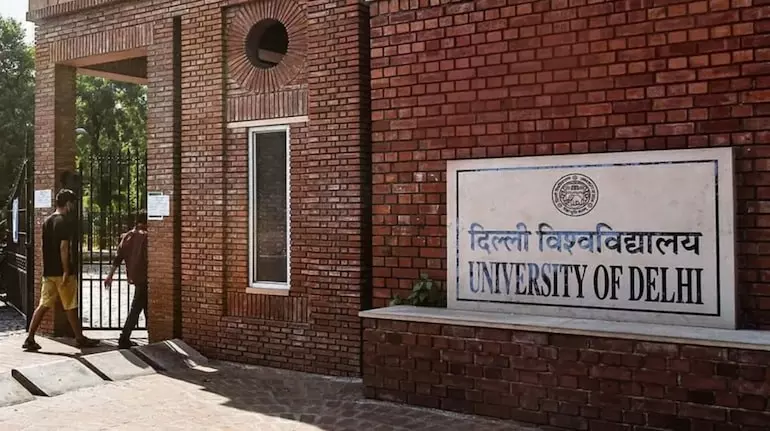
Is DU ready for 4th-year UG programme? Principals, teachers raise concerns
With exit options open until July 31 and unclear guidelines, DU colleges struggle with student numbers, workload, and research module specifics for the new batch

Two days before the Delhi University (DU) welcomed its first fourth year undergraduate batch of students under the Undergraduate Curriculum Framework (UGCF), teachers and principals of the affiliated colleges expressed doubts about the institution’s preparedness for the programme’s implementation.
The exact number of students opting for the fourth year, introduced under the National Education Policy (NEP) 2020, remains unclear as of now.
Exit option
On July 3, DU launched a portal to provide an “exit option” to students who have completed the three-year UG course and do not wish to continue for the fourth year.
Students can opt out until Thursday, July 31, just a day before the new session kicks off, making it difficult for colleges to accurately assess the number of students who would continue.
Also read: NEET PG 2025: Aspirants voice concern as Centre allotments ignore preferences
“Until some days ago, the data suggested that around 70 per e students would continue into the fourth year, but I don’t know the latest figures,” Haneet Gandhi, Dean, Admissions, DU, told The Federal.
'Students are unsure'
The principal of a top DU college said the date to apply for the exit option may be further extended, which means it could continue even after classes begin.
“We will have to start classes on August 1. We don’t have an option since the semester is already too short. But I think the university should have had a criterion for allowing the students to move into the fourth year. This is the first time, and students are unsure about what to do,” the principal said.
Also read: DU UG admissions: Over 72,000 accept allotted seats, colleges approve almost 15,000 applications
“People who are leaving are only those who have got placements or gone on to do an MBA (Master of Business Administration) or those who have got postgraduate admissions in more reputed places. Otherwise, this has become the default option. We are concerned that it can become a place where students just park themselves, so we’re holding orientations to tell them that this will be very research-intensive, and so they shouldn’t continue if they are not serious,” the official added.
Issues for 4th year batch
Other teachers have also pointed out that there are likely to be issues with the fourth-year batch.
“In my department, the good students have either been placed in companies and have left, or have taken the exit option to do a two-year MA (Master of Arts) programme (as opposed to the one-year MA that is available to those who do the fourth year).
“We are left with students who either have to repeat papers or those looking to prepare for competitive exams. How are we supposed to make them do research?” one of them working in an arts faculty asked.
Also read: PARAKH 2024 survey: Are national assessments hurting learning?
Under the UGCF programme, students in the fourth year can choose a research track. It is, however, still not clear how teachers and students will decide on the actual procedure of the research.
According to the teachers, there are no clear guidelines from the university on workload, compensation, or assessment.
The political science batch at Delhi's Deshbandhu College had 157 students. If around 70 per cent go forward – as per DU’s current data, that would be a large number of students to manage for teachers, especially when it comes to research.
'Research will be tricky'
“We are not being provided any data on how many students are staying back; we are just waiting for the college to open. Research will be a tricky affair. If 100 students are staying back, how will the choice of their research topic work with regard to the assignment of teachers? It’s also not clear if all teachers will get an equal number of students to guide or it will be decided by the hierarchy of teachers. Many things remain unanswered,” said Biswajit Mohanty, a teacher at Deshbandhu College’s Department of Political Science.
Also read: Wrong to use temple funds for education? EPS remark sparks row in TN
“In the first semester, they will learn how to review literature to prepare for research. But that would be tentative since they may not know what to do their research on, and there are likely to be changes in topics. In that case, the quality of research will suffer. In science, laboratory space is a big problem which will also affect research. This is likely to be a burden on both students and teachers,” he added.
It does not help that the university did not notify the syllabi for the fourth year until Tuesday, July 29, and that too, not for all courses.
“The syllabi for almost all PG courses and most of the UG courses have not been notified even now, even though they were passed by the Executive Council on May 23 and July 12.
“Without information, how are teachers supposed to prepare for courses, or inform students of electives or prepare labs? The callousness of the University shows its scant respect for students, teachers and learning processes,” said Abha Dev Habib, Secretary of the Democratic Teachers’ Front.
DU Vice-Chancellor Yogesh Singh and Registrar Vikas Gupta did not respond to calls and texts.

